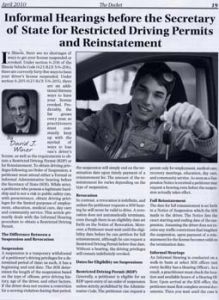Informal Hearings
Informal Hearings before the Secretary of State For Restricted Driving Permits and Reinstatement
~ David J. Winer
In Illinois there is no shortage of ways to get your license suspended or revoked. Under the Illinois Vehicle Code there are currently forty-five ways to have your driver’s license suspended and thirteen to have it revoked. Predictably, the list grows every year, so lawyers must keep up with the myriad of laws and the requirements to obtain driving privileges by attending an Administrative Hearing before the Secretary of State. While there are strict requirements, a petitioner with perseverance can succeed. This article deals with the Informal Hearing process in obtaining a Permit or reinstatement.
A). THE DIFFERENCE BETWEEN A SUSPENSION AND REVOCATION
Suspension
A suspension is a temporary withdrawal of driving privileges for a determined period of time and has a beginning and ending date. The Secretary of State determines the length of the suspension based on the type of offense, prior driving history, age of driver and other factors. If the driver does not obtain any convictions for a moving violation during the suspension it will end on the termination date. A reinstatement fee must be paid, and the amount is determined by the type of suspension.
Revocation
Typically entered for convictions of DUI, reckless homicide and several other serious traffic offenses, unlike a suspension, a revocation is indefinite. Unless the petitioner requests an SOS hearing they will never be valid to drive again. A revocation does not automatically terminate even though there is an eligibility date set forth on the Notice of Revocation. Only after a hearing will the SOS grant driving privileges.
B). DATES FOR ELIGIBILITY
Permits – Immediately after the revocation or suspension is entered
Full Reinstatement – for a first DUI conviction: One year, and if under 21 years old it is two years. For non-DUI revocations the eligibility date will be noted on the Notice of Revocation sent to the petitioner. (For multiple DUIs a Formal Hearing is required and not covered in the article)
Out of State Convictions for DUI.
Revocation for an out of state DUI conviction is mandatory. The arresting state reports the disposition to Illinois and since they do not have “Supervision” a conviction is entered revoking the license. There may also be an additional suspension or revocation prior to the disposition due to the Implied Consent holding in another State.
C). INFORMAL HEARING PROCEDURE
For first time DUI or Summary Suspension offender an Informal Hearing is conducted on a walk-in basis at certain Secretary of State facilities. Not every facility has a Hearing Officer, and they must check the location and available hours of a Hearing Officer. Upon arrival at the SOS facility there are several documents that must be completed and then wait until the case is called and proceed to the hearing room. Informal Hearings are conducted by the Hearing Officer who questions the petitioner. It is very important that the petitioner’s testimony be consistent with any submitted documentation. Following examination by the Hearing Officer the attorney can attempt to correct any missing, misleading or misunderstood testimony. The attorney’s primary role is assisting the client in advance to have all the proper documentation and prepare them for the potential questions.
There is no record of the proceedings, and an appeal cannot be filed. At the conclusion of the hearing, the Hearing Officer submits their findings and recommendation to the Department of Administrative Hearings in Springfield for final review and decision. Generally, within two to three months a written Order is prepared and sent to the petitioner with a ruling.
D). TWO TYPES OF DRIVING PERMITS
If granted a Permit the Secretary of State will mail the petitioner a list of requirements to be completed within a specified period of time. A “Restricted” Driving Permit is issued if the eligibility date has not passed, and the petitioner must prove a hardship. A “Probationary permit” is allowed only after the eligibility date has passed and no hardship is required to be shown. Any traffic offense or violations while on the permit can result in the cancellation or extension of the permit. It is critical to obey all the traffic laws and specifications of the Permit. If the petitioner is denied, they must have another hearing to remedy the specific reasons set forth by the Secretary of State.
PROBATIONARY PERMIT: A one year “Probationary Permit” allows driving 12 hours a day, six days a week within a 200-mile radius for any purpose and is issued to those whose eligibility date has passed and are eligible for full reinstatement A BAIID device is not required.
RESTRICTED DRIVING PERMITS (RDP): A “Restricted” Driving Permit is issued for one year and is limited to times dates, hours and requires proof an Undue Hardship and are issued drivers not yet eligible for full reinstatement. They are restricted for only employment, medical care for the petitioner or a family member, court ordered public service, education, day care or a support program. The Secretary of State also allows emergency repairs, routine vehicle care, including oil changes, tire rotation, alignment and emission testing, or service.
.
At the time of the hearing if the petitioner is not eligible for full reinstatement and is granted an RDP and while on the permit becomes eligible for reinstatement they can petition for full reinstatement if they drove on the RDP for nine of the twelve months.
E). UNDUE HARDSHIP
Prior to the termination re-eligibility date for a suspension or revocation a petitioner must prove an “Undue Hardship” due to the loss of their license. This would include a lack of reasonable alternatives to driving, such as public transportation, rides from others, cabs, walking etc., and that the lack of transportation poses a threat to their employment. Mere inconvenience does not constitute an undue hardship. It is good practice to prove an undue hardship by submitting a letter from the petitioner’s employer noting possible termination of employment, being late, limited duties, loss of income due to lack of advancement, promotion, reduction in hours, etc. If it relates to school, recovery meetings, day care or community service the petitioner must present evidence of the distance travelled, unavailability of alternate transportation and the inability to fulfill those tasks without a Permit.
F). FULL REINSTATEMENT
The full reinstatement date is set forth in the Notice which is mailed by the Secretary of State and lists the starting and eligibility date. For a revocation, if a permit is granted a second hearing is required for full reinstatement. If the eligibility date has passed and they drove on a permit without incident for nine of the twelve months, they may apply for full reinstatement three months prior to the expiration of the permit. For the second hearing, while treatment documents are not required, a new Update Evaluation must be submitted. The testimony at a reinstatement hearing is much less involved than the prior hearing. As before, in two to three months an Order is prepared and mailed to the petitioner.
For a suspension, if the driver does not receive any traffic convictions that lengthen the suspension, on the termination date and upon payment of a reinstatement fee their license is valid, and they do not need another hearing. Barring any traffic convictions, the suspension will simply end on the termination date provided the reinstatement is timely paid.
G) OTHER AREAS
Non-Alcohol Related Suspensions
Common suspensions include too many moving violations, possession of false identification or providing false information to the Secretary of State in obtaining a license or state ID card. At the Hearing the petitioner must (1) submit any letters regarding character, employment, day care, school schedule and hardship, (2) provide a plausible and acceptable reason for the past offense(s) that lead to the suspension, (3) convince the Hearing officer that they have reformed their driving habits and (4) will abide by all the regulations in a Permit.
Non-DUI Alcohol Related Suspensions
Non-DUI alcohol related suspensions are typically for minor consumption or possession of alcohol. Even if a Minor receives Court Supervision for consumption or possession of alcohol his license will be suspended for a minimum of three to twelve months. For these suspensions, an “Investigative Evaluation” and any recommended classes must be completed. The Evaluation must be conducted by an OASA licensed evaluator, and the original signed evaluation and treatment documents must be submitted to the Hearing Officer.
First Offense Driving Under the Influence Revocations
A driver convicted (as opposed to Supervision) for a first time DUI is eligible for an Informal Hearing if he does not have a prior DUI Court Supervision, Summary Suspension or Reckless Driving on their driving record. A conviction for a first time DUI can also be entered if a driver with an Illinois DUI has his supervision revoked, fails to appear in court or gets a conviction on a trial or plea of guilty. In this situation the driver must obtain a Uniform Evaluation and complete any recommended classes. All Evaluations must be completed within six months of the hearing date. If it is older than six months, the same agency that performed the original evaluation or the treatment should provide a new Updated Evaluation. However, a different agency may perform the evaluation if the original agency has ceased operating and a new agency has assumed its files. The petitioner does have the right to obtain a completely new evaluation from another OASA licensed agency. However, if a new agency completes the evaluation, it should prepare a full Uniform Evaluation, Treatment Needs Assessment and chronological drinking history. If no further treatment is required a Treatment Waiver should also be included.
Out of State Convictions for DUI
A Revocation for an out of state DUI conviction is mandatory. The arresting state reports the DUI disposition to Illinois and since they do not have “Supervision” a conviction and revocation is entered. For a first offender an Informal Hearing may be held at a local SOS Office, but the Permit and reinstatement eligibility dates are still applicable. There may also be an additional suspension or revocation prior to the disposition due to the Implied Consent holding in another State.

